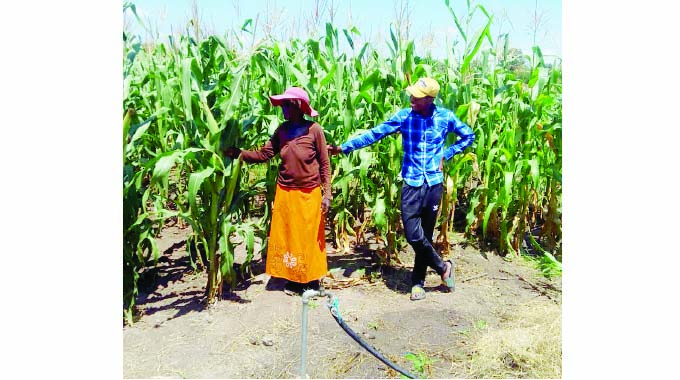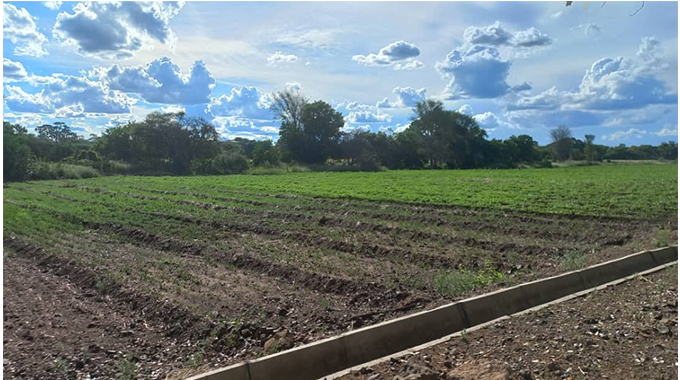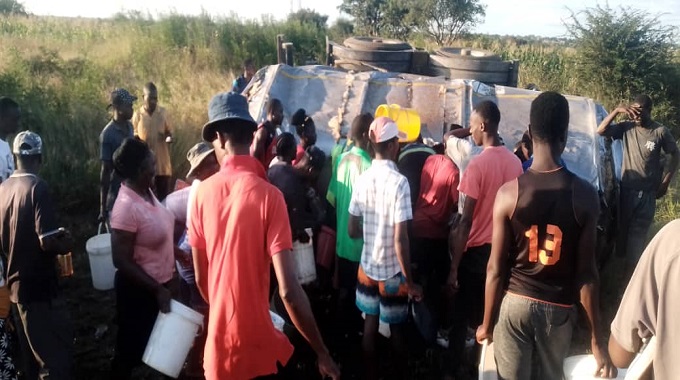Irrigation scheme becomes major source of livelihood

Sukulwenkosi Dube-Matutu, Matabeleland South Bureau Chief
TJINGABABILI Irrigation Scheme in Mangwe District which was underutilised for several years has become a major source of livelihood for the community after farmers upgraded the water system.
The irrigation scheme has 40 members who are producing good quality crops throughout the year.
It was established in 2002 with the assistance of Pro Africa Development Trust which provided a fence and helped to build a canal system.
When the irrigation scheme started, farmers were getting their water from Tjingababili Dam using the canal system.
Siltation resulted in the dam collecting little water resulting in a conflict between farmers and villagers.
Villagers complained that the project was taking up water meant for livestock.
Farmers were forced to practice rain-fed agriculture due to limited water supply for some time.
In 2019 the community working with Pro Africa Development Trust rehabilitated another dam in the area, Nkalebhule Dam which became a source of water for livestock while Tjingababili Dam was set aside for the irrigation scheme.
Last year, farmers decided to upgrade the water system and mobilised resources to install a solar-powered water system. Now, farmers have maize, vegetables, tomatoes, sugar beans, and maize on their two and half hectare irrigation scheme.
A farmer at the irrigation scheme, Mrs Samukeliso Dube said upgrading their water system has helped them record increased production.

Irrigation scheme
“As a community we realised that we had land that was lying idle and we decided to establish the irrigation scheme. We cleared the land and approached the councillor for assistance. A partner Pro Africa Development Trust assisted us with a fence and they also built canals for us. We started producing but there was always a challenge with water supply and we resolved that we needed to have a reliable source of water if we were to operate at full capacity,” she said.
“Each member contributed R100 towards upgrading the water system but the money was hardly enough and some members pulled out of the project. The councillor engaged the partner Pro Africa Development Trust again and they helped us to drill a borehole and to install a solar system at the irrigation. We now get our water from taps, which has made it easier for us to produce,” she said.
Mrs Dube said they were now able to produce good quality crops throughout the year. She said they sell their produce to nearby communities and schools.
Mr Blessing Masuku who is also a farmer at Tjingababili Irrigation Scheme said they were now able to fend for their families using proceeds from selling their produce.

Rands. Image taken from iStock
Mrs Nothando Nkomo said they have been trained on how to embark on farming as a business which has helped to improve their production and sales.
“It’s not only our water system that has improved but also our operations. We now run our project as a business enterprise and not only a food source for our families. We now focus on cash crops which are in high demand in the market. In our project we have a committee that is responsible for identifying new markets. We also grow seed varieties which are ideal for our soil and which mature faster,” Mrs Nkomo said.
He said they have also received inputs from Government which has also helped to boost operations.
Mangwe Rural District council chairperson, Clr Sindisiwe Nleya said Tjingababili Irrigation Scheme has significantly contributed towards ensuring food and nutrition security within the community.
She said previously the irrigation scheme was underutilised which had a negative impact on livelihoods.
Clr Nleya said there is need for communities to utilise water sources and land within their areas to ensure food and nutrition security.
“The community of Tjingababili took an initiative to revive their irrigation scheme and now many households are food secure.
This project is providing food to the community as well as farmers that are a part of the project. There are some water sources within the district which are lying idle yet they can be utilised for irrigation schemes, gardens among other projects. There are also some patches of land which can be turned into green oases,” he said.
“Government has also emphasised that these natural resources have to be utilised for the development of our country. The Second Republic has created a conducive environment for development partners to also contribute towards developing the agriculture sector.” – @DubeMatutu.








Comments